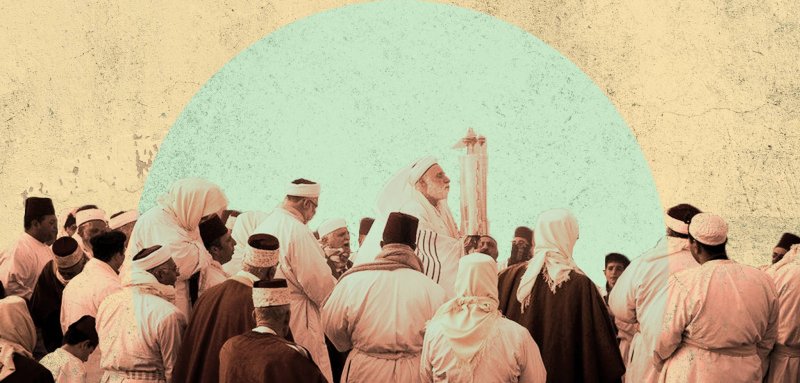A distance of only ten minutes separates the Samaritan district from the heart of the Palestinian city of Nablus, yet the inhabitants of the latter know little of their nearby Samaritan neighbors. My recent visit to the neighborhood where I spent the day led me introduced me to this community, whose customs and traditions have survived 3,500 years.
As soon as I arrived in the area of al-Tor at the highest point of Mount Gerizim, I noticed a difference in the buildings: signs and writings atop the neighborhood's homes are written in Old Hebrew of course in addition to the yellow registration plates reserved for Jews’ cars.
My destination was the Samaritan Museum located at the entrance of the neighborhood – established in 1996 as an initiative by the Samaritan priest Hosni Wassef Tawfik, with small funding from former Palestinian president Yasser Arafat – in order to familiarize others with the Samaritan religion and history. The priest is the author of many studies and books about the Samaritan sect, making him the first point of reference and authority on the conditions of the Samaritan religion and sect, its history, customs and traditions, and the details of everyday life in the community which he closely oversees.
Notwithstanding the small size of the museum, it contains a full and detailed description of the lives of Samaritans – the smallest religious sect in the world. A tour of the place enables the visitor to become informed of the Samaritan priesthood, history, pilgrimage and Torah.
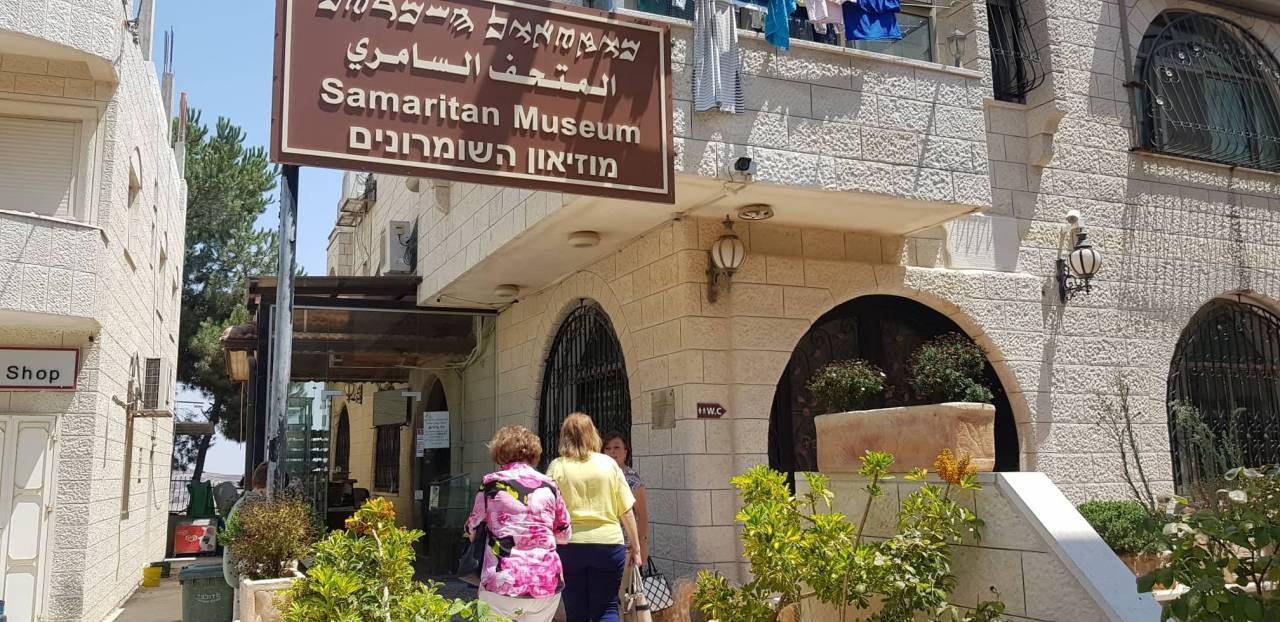
My arrival coincided with the priest's preoccupation with three Christian ladies visiting from Ramallah, one of whom lived in the United States and was curious about what she had heard from her friends about the Samaritans – accordingly scheduling a visit to the museum as part of her travel plans to the country. Yet as I began chatting with her, we were interrupted by a Jewish settler who asked about the museum's entry-price – the settler accompanied more than twenty children.
Jerusalem is Not The Holy Site
The high priest Wassef offers visitors of the museum – Jews, Muslims and Christians alike – a glimpse of the Samaritan religion, history and Old Torah, which led some religious Jews to wage a campaign against him – one which ultimately led to the decrease of his Jewish visitors from a proportion of 75% to only a quarter, he told Raseef22.
On the reason for this decrease, Wassef says that he explains to everyone, using evidence and proofs, that the Samaritan Torah consists of the original first five testaments [cannons] which were revealed to Moses and have not been altered since, stating: "We are the original descendants of the People of Israel [ancient Israelites], whilst the Jews currently present in Israel and around the world are those who defected from the faith, changing the holy site from the aforementioned [Mount] Gerizim which was mentioned in the Torah thirteen times, to Jerusalem which the Torah makes no mention of."
The priest also heavily lamented the Palestinians – and the people of Nablus in particular – who call them Jews, which he described as an "insult" to all Samaritans, as they are the ones who have held steadfast to the teachings of their religion from thousands of years up to the present day, while Jews to them – in the priest's expression – are those who split from the Samaritan religion and corrupted the Torah, while denying the holiness of Mount Gerizim. He explains: "This Torah differs from that followed by the Jews in 7,000 different discrepancies, from letters, to words to sentences and even an entire chapter.”
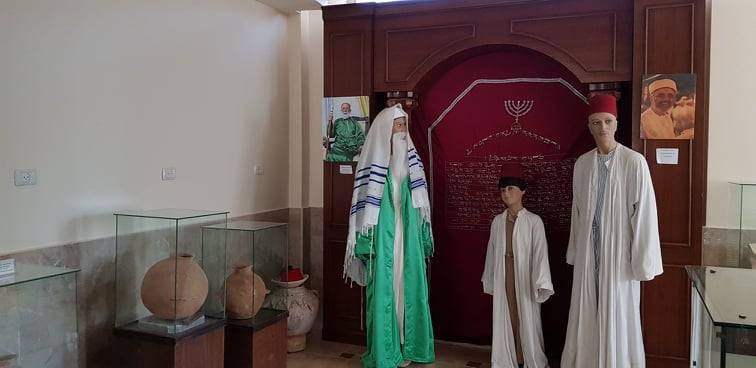
Abandoning Tradition to Avoid Prejudice
In our discussion of Samaritans’ rites, I asked the high priest Wassef if they had the religious ritual of growing their hair and sideburns. With a long smile he answered: "It is forbidden for a priest to cut his hair, but now no one grows it and I'm the reason."
Wassaf refers to an incident that took place in 1951, when he joined the first class of the Khaldiyah school in the city of Nablus; from his first day, he was subjected to the bullying by his classmates because of his long hair, and days later the school's administrator asked his father to cut his son's hair or otherwise not send him to the school; since then, Wassef explains, everyone began to cut their hair.
The abandonment of a religious custom to avoid any "prejudice or problems" within the social surroundings inhabited by the Samaritans is testament to the relationship with the Palestinian community built on mutual respect – as embodied by the late President Yasser Arafat on the founding of the Palestinian Authority, after which the Palestinian nationality was offered to the community despite their simultaneous possession of Israeli and Jordanian nationality; furthermore, Arafat allocated a seat for the Samaritan sect in the Palestinian Legislative Council.
The Jews steered from the faith, changing the holy site from the Mount Gerizim which was mentioned in the Torah thirteen times, to Jerusalem which the Torah makes no mention of.
On the Palestinian-Israeli conflict, the Samaritans have taken a position of neutrality, even though they fully believe in Palestine, and believe themselves to be Palestinians in the first degree and not Israelis
The Samaritans had originally left Egypt to reside in Palestine, especially in Nablus and Holon, and over the years their families also migrated there from Syria, Gaza and Jordan. However, according to Samir Yusuf – who handles the civil record of Samaritans and records births, deaths and marriages – over the past two centuries the Samaritans have become reduced to 400 in Mount Gerizim and 420 in Holon.
While the Samaritan community in Mount Gerizim unequivocally refuses to serve in the Israeli army, the Samaritans of the Israeli city of Holon do serve – albeit only in non-military administrative positions, with women abstaining from any service.
On the Palestinian-Israeli conflict, the Samaritans have taken a position of neutrality, even though they fully believe in Palestine, and believe themselves to be Palestinians in the first degree and not Israelis, as they regard Jews to have changed the location of the holy temple from Gerizim to Jerusalem for political reasons.
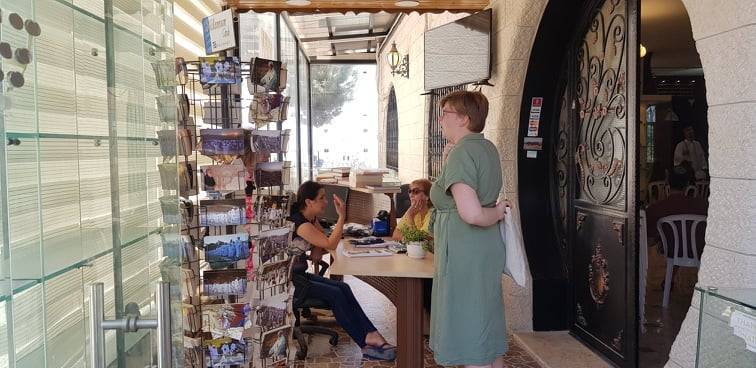
Religious teachings of the Samaritans
The Samaritan abides by the teachings, customs and traditions of their religion, never violating the sanctity of the holy day of Saturday – while all women rigorously comply with the religious injunctions pertaining to hygiene, and all men adhere to prayers in the synagogue.
The Samaritan prays twice a day to 'receive' the morning and night, while on Saturdays and during biblical holidays the number of prayers increases to seven, beginning at sunrise in what is known as the "Noba" whereby the males of the community assemble to read a part of the Torah. The Samaritan prayer requires ablution, covering the hair as well as ruku' (bowing down) and sujud (prostration).
The Samaritan also fasts one time during the year, five days before the biblical holiday of Sukkot – however, this fasting continues for a full twenty-four hours, with no one exempt other than breastfeeding children. Otherwise, it is obligatory for all to fast, even children of an early age, in accordance with the Torah's verse: "Every soul that is not punished on that day dies a death."
The Samaritans commemorate seven biblical holidays: Passover, the Festival of Unleavened Bread, the Harvest Festival, Tishrei (Festival of the First Day of the Seventh Month), Yom Kippur (Day of Atonement), Sukkot (the Festival of the Throne) and Shavuot (Festival of Weeks). There are two main holidays, the first of which is the 'Sacrifice of Passover', which takes place during the first quarter of the year, and encompasses the Samaritan's pilgrimage to Mount Gerizim and the offering of lamb as a sacrifice. Amongst the conditions for the Samaritan's pilgrimage is to walk on foot up from the Samaritan synagogue in the middle of the neighborhood to the peak of the 'holy mountain' (Mount Gerizim) – headed by the High Priest, the leader of the community, worshippers and a large segment of women, girls and children.
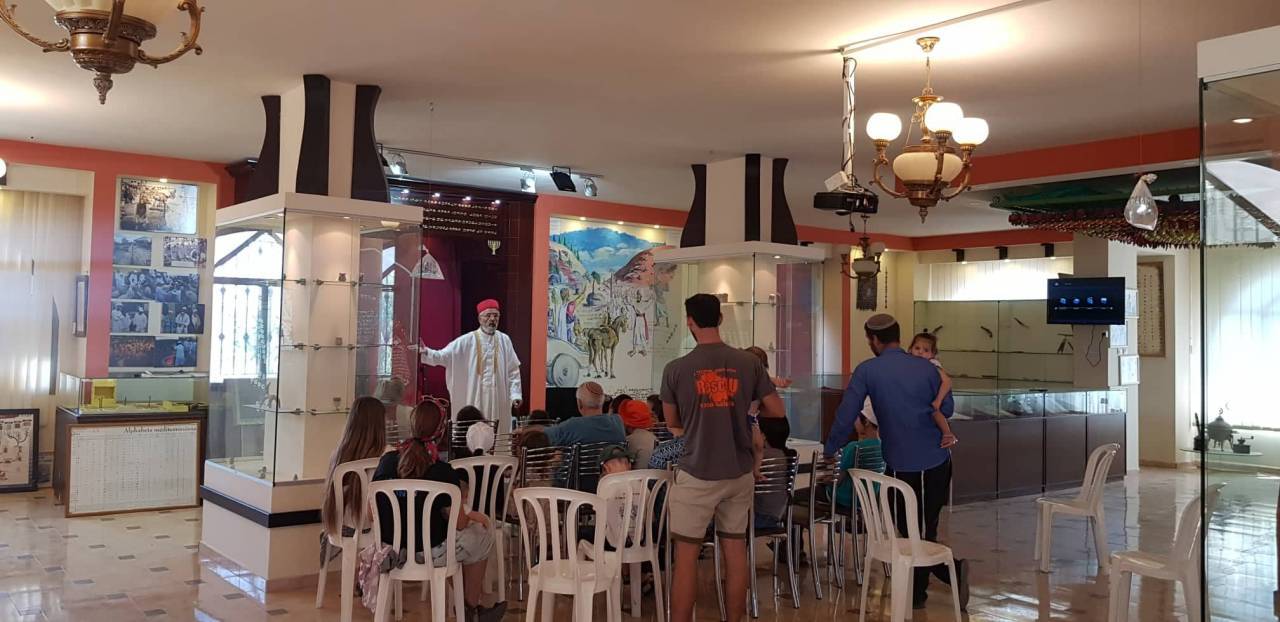
The second major Samaritan holiday is Sukkot – the "Festival of the Tabernacles (throne)", which continues for seven days. Here, Samaritans raise a Tabernacle or throne onto the roofs of their houses, eating, drinking and sleeping underneath it throughout the days of the celebration.
While Samaritan children receive their teaching in Palestinian schools, they also have their own night schools in which they learn Old (Biblical) Hebrew and the religious rites and worship of the sect; the child enters at five years of age, during which he concludes reading the Torah and learns the language.
The Distorted Image of Samaritan women
The daughter of priest Wassef, Badawiya (derived from the word 'Bedouin'), was for years the link between journalists and the community, coordinating media appearances. Badawiya (of whose name her father takes pride for its authentic Arab nature) says that there is a great ignorance surrounding her sect, and that the media has depicted the image of the sect's women in a distorted way.
Badawiya accompanied us during our time in the Samaritan neighborhood, and elaborated at length on the heavy religious obligations that falls upon Samaritan women.
The religious duties of the Samaritan girl start at puberty. The day on which the girl reaches puberty is announced to all of the community, with the girl subsequently receiving blessings and gifts as a form of encouragement that she will carry out her religious duty stipulated in the Torah.
Yet the proclamation of a woman's period (menstruation) does not only take place on the first time, for according to the Samaritan religion the girl is considered unclean during this period (which extends to seven days), and should not touch another human, object, food or drink besides that which she herself eats, drinks and wears – as well as the bed she sleeps in and the bathroom she uses.
The same applies to the period after a Samaritan woman gives birth, during the postpartum or post-natal period (i.e. the post-birth period of 41 days for a male newborn or 80 days for a girl), during which she is also prohibited from approaching anyone, and should not undertake pursuits other than taking care of herself and her child.
At this point, Badawiya was interrupted by a visitor who had been listening, who asked: "Is this not a degradation of women?", to receive Badawiya's response "For me, this period is one of rest and being spoilt [serviced or taken care of]: for the husband during this period is obligated to serve his wife in the most minute of details, and the women is freed completely from her house, family and spousal duties."
After the end of the post-natal period, the Samaritan women has to get washed in a water-tub, submerging herself for a few seconds under the water before reemerging to life once again – while also being required to clean her clothes in the same fashion.
At this point Badawiya breaks our shock with a smile, declaring: "Those who hear of these details for the first or perhaps the tenth time might find it difficult, but when a child grows up in a Samaritan household it becomes a normal thing - even the child's separation from their mother during the monthly period [menstruation]; this is a part of our ordinary day."
Polygamy is prohibited
Marriage also has its own specific custom within the Samaritan community as a "holy union"; it is also publicly proclaimed after the High Priest or his representative approves the marriage contract, with the dowry being delivered to the father (who keeps it) in a piece of cloth. This dowry is at most a single Jordanian Dinar – or $1.41 US Dollars. According to Badawiya, "my dowry was higher because I am the daughter of a priest, but it did not exceed a Dinar."
Samaritans are prohibited from getting divorced or marrying more than a single wife except in very specific circumstances. Indeed, Badawiya notes: "If polygamy was permitted for us it would not be possible because of the lack of girls."
The celebrations of the marriage begin early on Saturday after the sunrise prayer, which is read by everyone in the community at the groom's family house; this is followed by a feast assembling the men of both families, which is in turn succeeded with a simple ceremony for the women. On Sunday night the two families then assemble at a single table at the groom's family home.
On Sunday night, the groom's father reads a chapter of the Torah about marriage with the company of the groom, then proceeds to recite hymns and blessings in Biblical Hebrew. The wife holds a 'goodbye' celebration for women on the next day, and on Thursday the wedding is held.
Samaritans Don’t Eat Mansaf
Amongst the most observed Samaritan customs is their refusal to eat food from outside the community; indeed, a common saying known to everyone in Nablus is "Like the Samaritans, you don't eat at anybody's [house]." Badawiya attributes the reasons for this to the fact that the Samaritans have their own conditions for slaughtering animals: namely, "be clean" through ablution and covering the hair, while meat cannot be combined with milk – as with the religious Jews. Accordingly, Samaritans do not eat Mansaf and do not use cooking butter in their food.
On Thursday, the Samaritans cook white beans, while on some Sunday nights, they cook stuffed squash or zucchini (Mahshi). Meanwhile, during the day on Saturday, hand-prepared salads are consumed with milk or tahini – while it is prohibited to eat sweets and desserts during Passover. During Sukkot, deserts are confined to baklava made without butter or ghee.
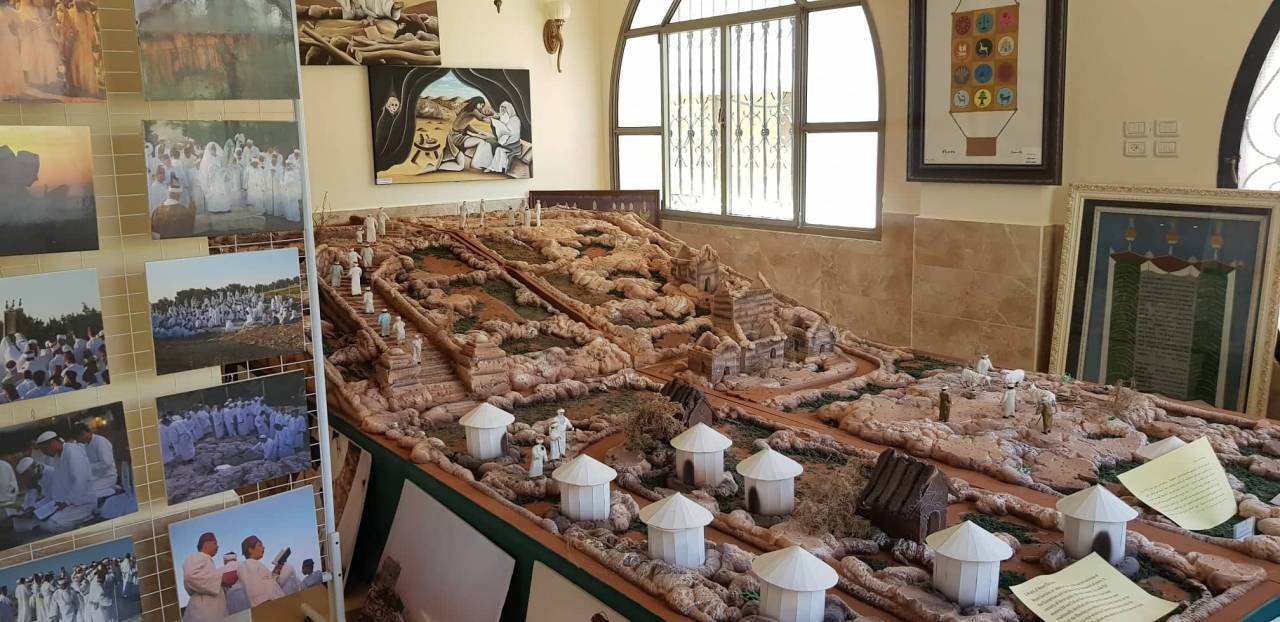
Fear of Extinction
The Samaritan community suffers from a low number of women relative to men. Yusuf al-Samer, of the civil records of the Samaritan community, told Raseef22 that this problem exists amongst more than one community residing on Mount Gerizim. He estimates that there are seven women for each twenty men (of marriage age) in the Samaritan community, a reality which has prompted the community's priests to permit marriage from outside the community, with the condition that religious injunctions for Samaritan women are observed. Indeed, during the past few years marriages have been undertaken with Muslims, Christians and Jews.
Despite this, priest Wassef says that he is not worried that the community may become extinct. He notes that the community's population 3,000 years ago stood at 3 million, 1,400 years ago at 1.2 million, for this number to dwindle down over the centuries to reach 146 members a year ago – though this has since recovered to 820, which Wassef says points to an increase in numbers, not a decrease.
Wassef added: "The priests are undertaking awareness campaigns [for families] to bear 'a lot' of children; however, the influence of contemporary life has meant that there is an average of two children per [Samaritan] family."
Samaritans and Magic
Samaritans in the city of Nablus and its environs are also known to indulge in witchcraft; however, priest Wassef rejects such allegations, saying that Samaritans do not believe in magic which is forbidden in the Samaritan religion.
However, Wassef also adds that Samaritans are suited to astronomy and astrology, through a knowledge of "the account of truth" which is only learnt by the families of priests. Here, Wassef says that these chosen ones are able to learn the exact dates of the moon's cycles for years to come, allowing them to predict the onset of Ramadan, Jewish and Islamic holidays according to the Hebrew lunar calendar.
Furthermore, by knowing the "account of truth" and the name of an individual and their mother (and if an individual is married, the name of the wife and her mother), Wassef and other priests can possess knowledge that allows them to make predictions and prophecies pertaining to that person.
Raseef22 is a not for profit entity. Our focus is on quality journalism. Every contribution to the NasRaseef membership goes directly towards journalism production. We stand independent, not accepting corporate sponsorships, sponsored content or political funding.
Support our mission to keep Raseef22 available to all readers by clicking here!
Interested in writing with us? Check our pitch process here!
